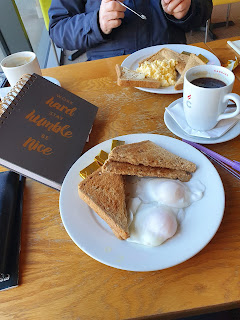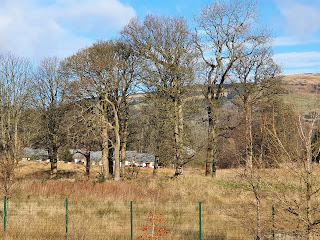I suppose all of us at some point in the last week have had a moment of reflection on war and what it means to us. My colleague, who I have worked with shoulder to shoulder for the last 30 years, is Russian, a Cossack Russian. And over the years we have had many discussions about what I think I know and what he thinks he knows, in the belief that the truth is swimming in the murky waters in between.
Working breakfast
For the blog, and only for the blog, I am suffering eating
this breakfast within twenty miles of Faslane nuclear submarine base. Just to prove
we’re brave. Meanwhile on a more serious note the adverts for the Meerkats have
been banned from the television, I think that will hit Putin just as hard as
been banned from the Eurovision song competition.
Scotland this morning is bitter cold in bright sunshine with blue skies and the spring flowers are starting to peep through. It seems very odd day to be discussing the absurdity of war. The closest conflict I can remember where people were killed was the Falklands where an 18 year old boy from our village was a kitchen porter on HMS Sheffield. It took a direct hit, all souls lost.
My other friend, the ex
marine saw active service in Northern Ireland which was a very different kind
of conflict.
Over that hill is the Clyde and Faslane.
My mother who is now 86, was too young to be evacuated in WW2. Being
brought up in Govan they were bombed on a nightly basis. My uncle
Gordon was evacuated to the Ayrshire coast. From his life as a wee boy running
about the tenements, he had never really seen the sea or grass, and only horses
he saw were the ones who pulled the milk float and the one belonging to the Rag
and Bone man. As a 6 year old he ran full pelt under the belly of a Clydesdale
on the farm he was evacuated to. Any other breed of horse would have kicked him
into the middle of next week. The Clydesdale just picked its head up, snorted
in disdain and went back to grazing and a 6 year old Uncle Gordon got his arse
skelped.
The garden centre is in the grounds of the home for ex serviceman injured in action.
My mum remembers many nights spent in the air raid shelter, sleeping in blankets while my gran sat and knitted blankets for the war effort
– even when she was 104 my gran would still talk about the 'war effort'. My
grandad was an electrician, a reserved occupation, so he was in the Home Guard
making sure the blackout regulations were adhered to. He used to go back up to
the flat and make cups of tea and bring them down to the shelter. My mum used
to think that he was up there dodging the Germans, just to put the kettle on.
She was about 3 at the time.
My gran’s experience goes as far back as WWI where she lived as a child in an orphanage in Sheffield, she managed to get herself bombed by a Zeppelin. Sheffield was probably the major UK steel works so was a big target for bombing. On a clear night the kids in the orphanage would sneak out the dorm and watch the sky, listening for the almost silent whir of the Zeppelin engines as they went overhead. And then they would come in and hide under the bed. She’d be about 10 or 11 at the time.
Cottages of ex serviceman in the trees.
She
was the youngest of 11 children and her father had to put them in the orphanage
when their mother died. But she always knew her dad and her brothers and
sisters. While she was always happy to tell us stories of Govan life during the
blitz, she never spoke about the family's experience of WWI. To this day I don’t
know how many of her brothers were killed in action, but I do know that 3 of
them committed suicide during the year of their return. And she could never say
that without tears in her eyes, she always used to shake her head and comment
that it was the best thing for them as they could not live with the horrors
they have seen.
Seems a facile thing to say but those who have fought in war or lived through it, are very keen not to have another one.
It’s a depressing blog for a depressing world lets hope
normal cheeky and irreverent blogging service can return next week.
Caro



















When my son was 18-years-old he taped an interview with his favorite grand uncle, who also was the favorite uncle of my brothers and I. Uncle Benny regaled us as kids with stories of his youth, both as an orphan using his wits to survive the Great Depression, and later as a sergeant in the US Army who spent virtually all of WWII in combat in the European theater--the last several months as a Jewish POW in a German Prisoner of War Camp.
ReplyDeleteThe interview filled two 45-minute cassettes, and my son entrusted them to his father for safekeeping.
They were so safely kept that it wasn't until 30+ years later that I found them. They have since been digitized...and listened to ... spellbound. War changed not just Uncle Benny but all who for years prayed for his safe return--including my grandmother, whose hair turned white overnight upon learning of his capture in the Battle of the Bulge.
War changes all of us who take the time to think about it.
Thanks, Caro, for getting us to do just that.
I, too, hope for the return of your normal cheek. Alas, I feel these difficult times will not end for too many years to come. :-(
ReplyDeleteI could never get my grandfather to tell me stories of the Anglo-Boer war, nor my father of WWII. It was all buried deep in their minds and souls.
ReplyDelete